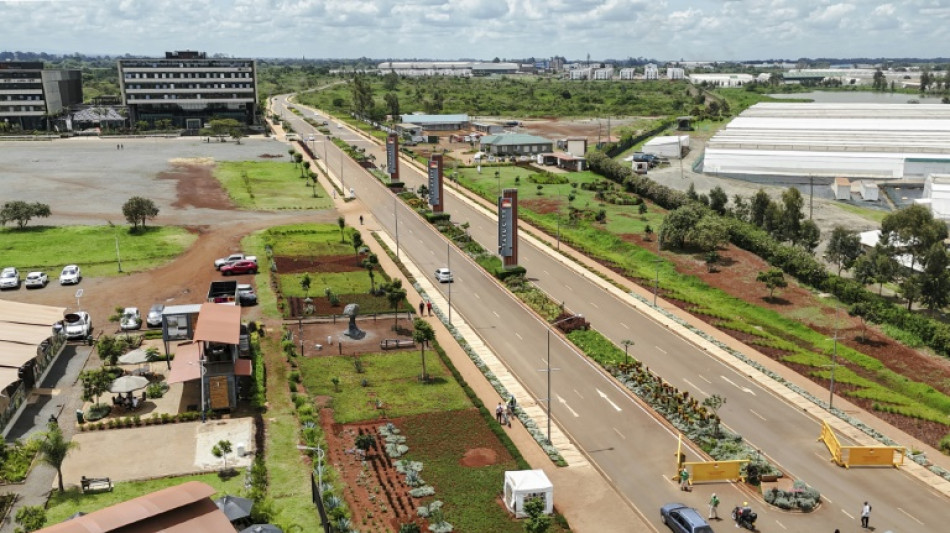
SCS
0.0200

In a leafy Nairobi suburb, a Kenyan firm helps foreigners track shoplifters, monitor lung damage from Covid-19 and identify whales -- tapping into the outsourcing market's artificial intelligence-boosted boom.
Cloudfactory started in Kenya in 2014, initially doing simple tasks like transcription for overseas clients.
But since 2024, it has taken on a wide array of AI-powered business that is transforming the sector and raising hopes Africa could become a new hub for digital outsourcing.
Clients include Charles River Analytics, a US robotics firm that needed its AI trained to spot whales so its unmanned vessels would not collide with them.
For other firms, Cloudfactory analyses medical X-rays, helps insurers spot damaged roofs and measures forest cover to see whether carbon-offsetting projects live up to their hype -- employing 130 staff and 3,000 freelancers in the process.
"We still need people to tell machines what to do and verify what they produce," said Cloudfactory Kenya director Festus Kiragu. "And that is creating jobs -- lots of jobs."
Kenya certainly needs them. Roughly a million people turn 18 in the east African country each year. Eighty percent end up in informal, poorly paid work, fuelling social unrest that has lately spilt over into violent protest.
Traditional outsourcing is already booming.
In the swanky recently built offices of CCI in Tatu City, a new town on Nairobi's outskirts, some 5,000 staff answer calls from customers of US airlines, banks and retailers.
The firm hopes to double its personnel by 2030 and receives hundreds of hopeful candidates each week.
"It's an entry-level job, let's not sugar-coat it, but you get a chance and you can build a real career," said CCI Kenya CEO Rishi Jatania, who said he started "on the phones" himself.
- Mental health impact -
Africa currently accounts for just two percent of the world's business outsourcing.
But rising wages in established hubs like India and the Philippines are pushing firms towards the continent.
Kenya is a frontrunner thanks to its educated, English-speaking, tech-savvy youth and good internet.
Some 35,000 employees already work in outsourcing, and that could rise to 100,000 within three or four years with the right nudge from the government, according to Genesis, a global consultancy.
However the push to grow the sector has not been universally welcomed.
Last year a court ruled social media giant Meta could be sued in Kenya over working conditions at the outsourcing firm Sama, tasked with removing violent and hateful content from Facebook.
Critics have also long alleged that moderation work poses a high risk to the mental health of workers.
And overseas firms have frequently come under fire for outsourcing tasks to exploit cheap labour costs while investing little in their local employees' futures -- or the economies of host nations like Kenya.
Meta argued it was not the direct employer, and many in the sector fear the Sama case will scare off clients, though it has taught them lessons.
"Content moderation is still critical and our workers want those jobs because they pay a premium," said Kiragu, the Cloudfactory chief.
"But that work needs to be on a rotational basis -- do it for two months and then do something else."
- Long-term view -
The recently formed Outsourcing Association of Kenya is pushing for cheaper work permits and tax breaks to help it compete with Asia.
But with debt-ridden Kenya in urgent need of revenue, the negotiations with the government have been tough.
"We also need the government to market Kenya as (an outsourcing) centre, the same way they do for tourism," said Kiragu.
Sometimes that means changing investors' outdated perceptions of Africa.
"I've been asked... 'Are there giraffes and lions outside your window?'," said CCI's Jatania with a chuckle.
Looming over everything is AI, which created those new jobs and could just as quickly destroy them if education and training do not keep pace.
"Customer experience jobs at call centres are great for entry-level but they are the most vulnerable to AI," said Betty Maina, a Kenyan former trade and industrialisation minister now with the Genesis consultancy.
"Reskilling people for the new demand is going to be critical."
For now, there is still plenty of work for humans, insisted Jatania.
"If you miss your flight... the last thing you want to do is talk to a bot."
K.Pokorny--TPP